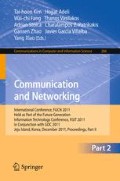Abstract
In this paper, an artificial bandwidth extension (ABE) algorithm from narrowband to wideband is proposed in order to improve the quality of narrowband speech. The proposed ABE algorithm is based on spectral band replication in the modified discrete cosine transform (MDCT) domain with no additional bits. In particular, the patch index search for the replication band is restricted so that the harmonic structure of the wideband speech is maintained after ABE. In the proposed ABE algorithm, we first determine whether the current analysis frame of speech signals is voiced or unvoiced. A harmonic spectral replication or a correlation-based replication approach is then applied for the voiced or unvoiced frame, respectively. The proposed ABE algorithm is finally embedded into the G.729 speech decoder as a post-processor. It is shown from the subjective evaluation using a MUSHRA test that the mean opinion score of the wideband speech signals extended by the proposed ABE method is measured as 75.5, which is higher of around 14% than that of narrowband speech signals.
Access this chapter
Tax calculation will be finalised at checkout
Purchases are for personal use only
Preview
Unable to display preview. Download preview PDF.
References
Mikko, T., Lasse, L., Anssi, R., Henri, T.: Scalable super-wideband extension for wideband coding. In: Proceedings of ICASSP, pp. 161–164 (2009)
Stephen, V.: Listener ratings of speech passbands. In: Proceedings of IEEE Workshop on Speech Coding, pp. 81–82 (1997)
Park, N.I., Kim, H.K., Jung, M.A., Lee, S.R., Choi, S.H.: Burst packet loss concealment using multiple Codebooks and comfort noise for CELP-type speech coders in wireless sensor networks. Sensors 11(5), 5323–5336 (2011)
ITU-T Recommendation G.830: Subjective Performance Assessment of Telephone-band and Wideband Digital Codec (1996)
Goode, B.: Voice over internet protocol (VoIP). Proceedings of the IEEE 90(9), 1495–1517 (2002)
Kosuke, T., Kei, K.: Low-complexity bandwidth extension in MDCT domain for low-bitrate speech coding. In: Proceedings of ICASSP, pp. 4145–4148 (2009)
Rogot, S., Kovesi, B., Trilling, R., Virette, D., Duc, N., Massaloux, D., Proust, S., Geiser, B., Gartner, M., Schandl, S., Taddei, H., Yang, G., Shlomot, E., Ehara, H., Yoshida, K., Vaillancourt, T., Salami, R., Lee, M.S., Kim, D.Y.: ITU-T G.729.1: an 8-32 kbit/s scalable coder interoperable with G.729 for wideband Telephony and voice over IP. In: Proceedings of ICASSP, pp. 529–532 (2007)
Jax, P., Vary, P.: On artificial bandwidth extension of telephone speech. Signal Processing 83, 1707–1719 (2003)
Song, G.-B., Martynovich, P.: A study of HMM-based bandwidth extension of speech signals. Signal Processing 89, 2036–2044 (2009)
Kornagel, U.: Techniques for artificial bandwidth extension of telephone speech. Signal Processing 86, 1296–1306 (2006)
Pulakka, H., Laaksonen, L., Vainio, M., Pohjalainen, J., Alku, P.: Evaluation of an artificial speech bandwidth extension method in three languages. IEEE Transactions on Audio, Speech, and Language Processing 16, 1124–1137 (2008)
Kim, K., Lee, M., Kang, H.: Speech bandwidth extension using temporal envelope modeling. IEEE Signal Processing Letters 15, 429–432 (2008)
Murali, M.D., Karpur, D.B., Narayan, M., Kishore, J.: Artificial bandwidth extension of narrowband speech using Gaussian mixture model. In: Proceedings of ICASSP, pp. 410–412 (2011)
Tsujino, K., Kikuiri, K.: Low-complexity bandwidth extension in MDCT domain for low-bitrate speech coding. In: Proceedings of ICASSP, pp. 4145–4148 (2009)
Kondoz, A.M.: Digital Speech: Coding for Low Bit Rate Communication Systems, 2nd edn. Weiley (2004)
ITU-T Recommendation G.729: Coding of Speech at 8 kbit/s Using Conjugate-Structure Code-Excited Linear Prediction, CS-ACELP (1996)
ITU/ITU-R BS 1534: Method for Subjective Assessment of Intermediate Quality Level of Coding Systems (2001)
EBU.: Sound Quality Assessment Material Recording for Subjective Tests (1988)
Author information
Authors and Affiliations
Editor information
Editors and Affiliations
Rights and permissions
Copyright information
© 2011 Springer-Verlag Berlin Heidelberg
About this paper
Cite this paper
Park, N.I., Lee, Y.H., Kim, H.K. (2011). Artificial Bandwidth Extension of Narrowband Speech Signals for the Improvement of Perceptual Speech Communication Quality. In: Kim, Th., et al. Communication and Networking. FGCN 2011. Communications in Computer and Information Science, vol 266. Springer, Berlin, Heidelberg. https://doi.org/10.1007/978-3-642-27201-1_17
Download citation
DOI: https://doi.org/10.1007/978-3-642-27201-1_17
Publisher Name: Springer, Berlin, Heidelberg
Print ISBN: 978-3-642-27200-4
Online ISBN: 978-3-642-27201-1
eBook Packages: Computer ScienceComputer Science (R0)

